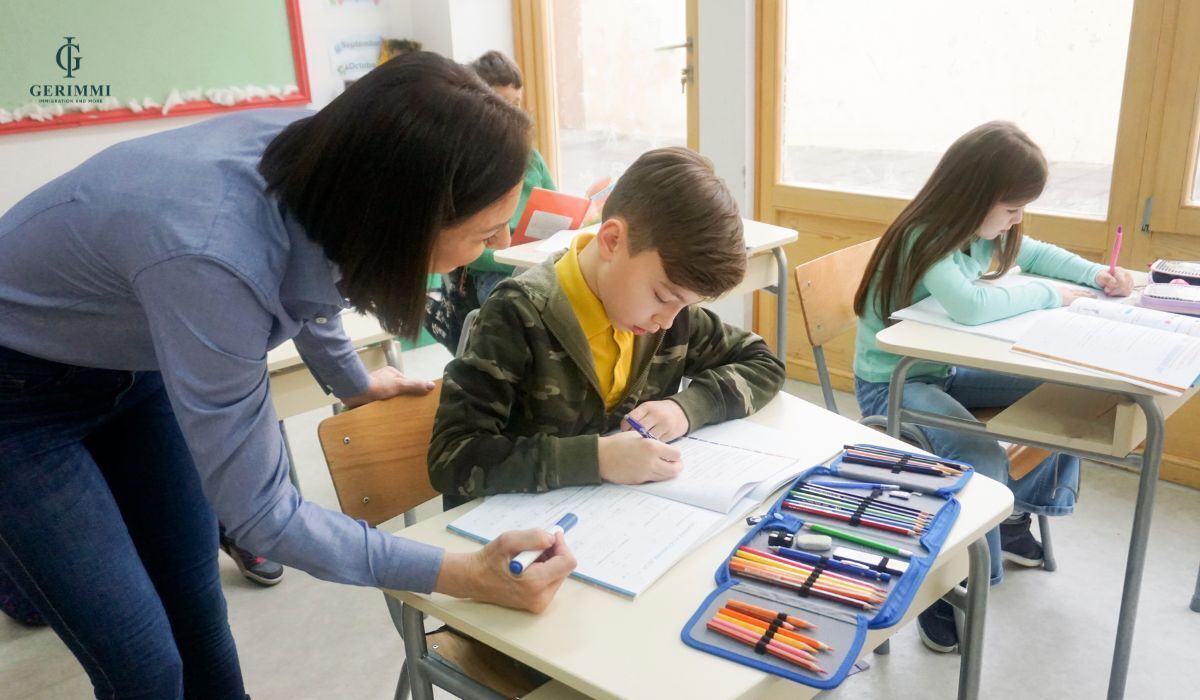The early childhood education sector in Australia is currently one of the sectors with the greatest demand for human resources. With a clear learning path from Certificate III in Early Childhood Education and Care to Diploma of Early Childhood Education and Care, students are not only equipped with practical knowledge and skills but also have expanded opportunities for work, improvement of qualifications and permanent settlement.
I. Studying preschool education in Australia is a great choice.
In the context of Australia's severe shortage of preschool teachers, studying vocational training in Australia in the field of Early Childhood Education and Care has become one of the hottest choices for international students. According to statistics from the Australian Government, by 2025, the country will need tens of thousands of more workers in the field of early childhood care and education.
The attractive points of the preschool vocational training program in Australia are:
- Short study period (1–2 years), focusing on practice.
- Cheaper than university, but still ensures globally recognized training quality standards.
- There are many opportunities for part-time work during the study period, helping international students gain experience and earn income to cover living expenses.
- Being on the Priority Migration Occupation List (MLTSSL), opens up the opportunity to stay in Australia long term after graduation.
Therefore, choosing to study preschool education in Australia will not only help you quickly find a job, but also be a safe route to settling in the land of kangaroos.

II. Why should you study early childhood education in Australia?
1. Huge demand for human resources
Industry early childhood education in Australia is facing a serious shortage of teachers. According to statistics from the Australian Government, each year the country needs to add tens of thousands of new staff in the field of child care and education.
The reasons come from the population growth rate, the increasing demand for childcare from families, and the expansion of the nursery system and childcare centers. Therefore,Studying vocational training in Australia in the field of preschool educationOpen up almost certain job opportunities after graduation, no worries about unemployment.
2. Be on the Skilled Occupation List (SOL)
One of the most attractive aspects of the early childhood industry in Australia is that it is aSkilled Migration List (SOL/MLTSSL). That means, international students after completing the course and meeting the necessary conditions will have the opportunity to apply forPost Study Work Visa to stay and work, then move onPermanent Residency (PR).
This is the reason why many young people choose preschool education in Australia as a sustainable path to both develop a career and settle down in the world's leading developed country.

3. Attractive income
In addition to open job opportunities,preschool teacher income in Australia is also quite impressive. The average salary ranges from 65,000 - 80,000 AUD/year, equivalent to approximately1,200 – 1,500 AUD/weekdepending on experience, job position and working area. For those taking on center management positions, salaries can be up to 90,000 AUD/year.
4. Opportunity to improve skills
Select Studying early childhood education in Australia, students do not only stop at vocational certificates such as Certificate III or Diploma, but also have the opportunity to transfer to university or master's degreeContinuing your education will help you improve your professional knowledge and management skills.
At the same time, it opens up more career opportunities such as becoming a trainer, researcher or senior manager in the education sector. This is also an effective way to increase points when considering Australian immigration.

5. Professional learning and working environment
Australia is renowned for its high quality education system, particularly in the field of early childhood education. Courses here are designed and accredited by ACECQA (Australian Children’s Education & Care Quality Authority)National agency for managing the quality of children's education.
This ensures that students receive thorough training, plenty of practice opportunities and exposure to professional environments while still in school. After graduation, the degree you receive will be widely recognized throughout Australia and many other countries, providing a great advantage in the labor market.
III. Vocational pathways & training programs
1. Certificate III in Early Childhood Education and Care
This is the most basic certificate when you start your early childhood education in Australia. The programCertificate III in Early Childhood Education and CareUsually lasts from 6 to 12 months, focusing on providing basic knowledge and practical care skills, supporting the comprehensive development of children from 0 to 5 years old.
Students will learn skills such as organizing play activities, observing and assessing children's development, ensuring safety and health care. After graduation, you are qualified to work in positions such as:teaching assistant, child care support staff in a nursery, kindergarten or childcare centre. This is a compulsory level of education if you want to work in early childhood education in Australia.
2. Diploma of Early Childhood Education and Care
After completing Certificate III, you can continue your studies atDiploma of Early Childhood Education and CareThis is a higher level, lasting about 1-2 years, focusing on training skills in teaching planning, designing development programs for children, and practicing management and leadership skills in a preschool environment.
Diploma graduates can take on roles lead educator, classroom manager, or preschool center operatorThis is also the level chosen by many international students because it meets the requirements for employment and skilled settlement in Australia.
.jpg)
3. Advanced Diploma, Bachelor and Postgraduate (transfer)
Special features ofStudying vocational training in Australia in the field of preschool education is a student canlink to higher levelAfter completing the vocational program. From the Diploma, you can continue your studiesAdvanced Diploma, cử nhân (Bachelor of Early Childhood Education), evenPostgraduate.
This interconnection offers many advantages:
- Increase career opportunities with positions as training lecturer, education manager or research specialist.
- Higher salary, ranging from 80,000 - 100,000 AUD/year depending on location.
- Plus points in Australian immigration application, as higher levels of education are often given priority in the skills scale.
Thus, the path to vocational training in early childhood education in Australia is very flexible: you can start from Certificate III, upgrade to Diploma, then go further with a university or postgraduate degree depending on your career and settlement goals.
IV. Entry requirements & admission to study vocational training in Australia in the field of preschool education
To be able to register for coursesCertificate IIIgoodDiploma in Early Childhood Education in AustraliaInternational students need to meet the following basic entry requirements:
1. Education level
Candidates mustHigh school graduate (grade 12) or equivalentSome schools may accept students who have completed Year 11, but often require an additional foundation course. This is an important requirement to ensure you have the foundation knowledge to keep up with vocational training programs in Australia.
2. English proficiency
Early childhood education requires good communication skills and language understanding as you will regularly work with young children, parents and native colleagues. Therefore, you need to achieveIELTS minimum 5.5 - 6.0 (no skill below 5.0). In addition to IELTS, some schools accept equivalent certificates such as PTE Academic or TOEFL iBT. If you do not meet the standards, you can register for a courseELICOS Englishto improve before entering the main program.
3. Age
The mandatory condition is 18 years and older at the time of enrolment. This is an Australian Government requirement to ensure that international students are mature and capable of taking on responsibility for childcare.

4. Required documents
Application for studying preschool in Australia includes:
- High school transcript, diploma to prove education.
- IELTS certificate or equivalent to demonstrate English proficiency.
- Passport valid for at least 6 months.
- Statement of Purpose (SOP), clearly state your learning goals and career orientation.
- Additionally, some schools may requirePersonal CVor letter of recommendation.
5. Other requirements
Due to the nature of the work directly related to young children, some schools in Australia will require students to have a health check, medical test to ensure eligibility for study and internship. In addition, you may need to submitPolice Check/Working With Children Check to prove no criminal record.
V. Cost of studying and living when studying preschool education in Australia
|
Expenses |
Average Spending (AUD) |
Note |
|
Certificate III Tuition |
12,000 – 15,000/year |
Study time: 12 – 18 months |
|
Diploma Tuition |
14,000 – 18,000/year |
Study time: 18 – 24 months |
|
Registration Fee & Materials |
200 – 500 |
One time only upon admission |
|
ELICOS English (if required) |
350 – 450/week |
Depends on level and study time |
|
Housing (homestay, room rental, dormitory) |
180 – 350/week |
Sydney, Melbourne higher than other states |
|
Eating, traveling, living |
150 – 250/week |
Depending on personal lifestyle |
|
Overseas Health Insurance (OSHC) |
500 – 700/year |
Required for international students |
|
Other expenses (entertainment, shopping, travel) |
50 – 100/week |
Optional |
VI. Job and settlement opportunities after graduating from preschool education in Australia
After completing the programCertificate III or Diploma of Early Childhood Education and Care, international students can easily find jobs at many different educational institutions. Some popular positions include:
- Child Care Centre:This is the environment where most graduates will start their careers. You will be responsible for caring for, supporting and teaching children from 6 months to 5 years old.
- Kindergarten/Preschool:With a Diploma or higher, you can take on the role of lead teacher, taking charge of the classroom and developing the curriculum for children.
- Out of School Hours Care (OSHC):Suitable for those who want to work flexibly, support children in extracurricular activities or after school hours.
1. Attractive income
The early childhood education industry in Australia hasAverage salary from AUD 28 – 35/hour, equivalent65,000 – 80,000 AUD/yeardepending on location and experience. In big cities like Sydney, Melbourne, Brisbane, the salary is even higher. This is a dream number, especially for international students who have just graduated.
In addition, if you continue to studyBachelor of Early Childhood Education, you can become a registered early childhood teacher, with an average salary of 80,000 – 100,000 AUD/year.
2. Opportunity for permanent settlement
What makes this industry an attractive choice for international students is that it is located inMedium and Long-term Strategic Skills List (MLTSSL)This opens up a number of pathways to apply for permanent residency in Australia:
- Post-Study Work Visa (485):After graduation, students can apply for this visa to stay in Australia to work for 2 - 4 years, gain more experience and improve their immigration profile.
- Permanent Residency (PR) for skilled workers:With a recognised qualification, plus work experience and a good English score, you can apply for PR. This is the most popular route to Australian early childhood immigration.
- State Nomination:Some states likeVictoria, Queensland, South AustraliaThere is a constant shortage of preschool staff, so a priority sponsorship policy is introduced. This helps increase settlement points, improving the possibility of being granted PR.

3. Stable career prospects
According to Australian Government figures, the demand for early childhood education workers is expected to grow strongly in the next 5-10 years, due to the growing child population and the expansion of childcare services. This ensures that international students will have a job after graduation.no worries about unemployment, and have the opportunity to develop a sustainable career.
VII. Factors to consider before choosing to study preschool education
Studying preschool education in Australia offers many job and settlement opportunities, however, to make the right choice, you should carefully consider the following factors:
- English ability
The early childhood industry is a field that requires continuous and effective communication. You will not only talk to children in the classroom, but also need to communicate with parents, colleagues and the center management. Therefore, English is not only an entry requirement (IELTS 5.5 - 6.0) but also a deciding factor in whether you can integrate well into the working environment in Australia or not.
- Patience and passion for the profession
You need patience, love, and the ability to handle a variety of situations: from soothing a crying child, supporting learning, to ensuring safety during playtime. Early childhood education requires dedication and responsibility.
- Study location & living costs
In major cities like Sydney and Melbourne, the cost of accommodation, transport and food can be significantly higher than in other states. If you want to save money, you can consider studying in Brisbane, Adelaide, Perth or Tasmania where costs are lower but the quality of education is still guaranteed.

- Settlement plan
If your goal is to settle in Australia as an early childhood educator, you need to carefully study the skilled migration policies of each state. For example, Victoria, Queensland and South Australia often have their own sponsorship programs for international students in the early childhood education sector. Choosing the right state to study will not only help you have more job opportunities, but also increase your chances of successfully applying for PR after graduation.
- Interoperability and career development
One advantage of studying early childhood education in Australia is that you can progress to higher levels of education. After completing Certificate III, you can continue to study for a Diploma, then a Bachelor of Early Childhood Education, or even a Postgraduate if you want to teach or do research.
Conclusion
Studying early childhood education in Australia not only provides professional knowledge and teaching skills but also opens up a path to sustainable settlement. With a variety of programs from Certificate III, Diploma to Bachelor, you can completely build a study and career path that suits your personal goals.

